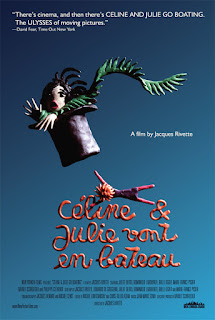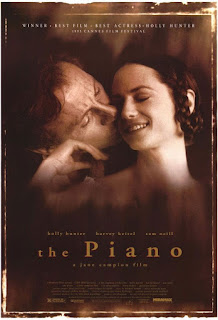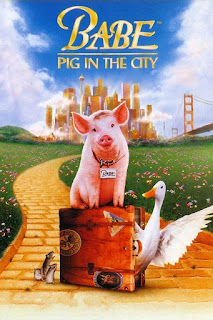March 25th: CÉLINE AND JULIE GO BOATING (Jacques Rivette, 1974)
NOTE: This film will be projected in the high-definition Blu-ray format.
A mild-mannered librarian meets a frantic stage magician, and after forming a fast friendship, they take turns investigating the mysterious happenings inside an old house.
Jacques Rivette was a critic for the French film magazine Cahiers du Cinema, and along with some of his fellow writers (François Truffaut, Jean-Luc Godard, Claude Chabrol, Eric Rohmer) became a director himself and was instrumental in creating the French New Wave. He became primarily known for his experimentations with narrative form and for long running times, particularly his 12+ hour film Out 1.
In 1973, Rivette abandoned a planned project with actress Jeanne Moreau due to lack of funding, and turned to actress Juliet Berto, who had also appeared in his previous film. The director introduced Berto to actress Dominique Labourier, and the two women began writing together, initially exploring ideas about role-reversal and doubling inspired by Ingmar Bergman's Persona, and then moved to structuring their ideas around game-playing.
Rivette was interested in creating a "film within a film", and drafted Argentine writer Eduardo de Gregorio to contribute. Several stories from Henry James were mined for material, creating a parody of a costume drama for the main subplot. The device by which the two storylines merge also created a metatext and helped Rivette expand his pet themes of actor vs. role, storytelling vs. reality, theatre vs. film, and filmmaking vs. film viewing. Other inspiration included Alice's Adventures in Wonderland, Marcel Proust, and Argentine writers Jorge Luis Borges and Adolfo Bioy Casares.
Joining Berto and Labourier in the cast are Marie-France Pisier (Truffaut's Antoine Doinel series), Rivette veteran Bulle Ogier (Out 1), and the film's own producer Barbet Schroeder, a successful director himself. The film was shot on 16mm during the summer, primarily in the Montmartre neighborhood of Paris. Behind the camera was former assistant Jacques Renard, in his first film as cinematographer. The film was edited by Nicole Lubtchansky, who began working with Rivette on his third feature and would edit every one up through his final film in 2009.
While the freewheeling style of the film suggests improvisation, unlike some of Rivette's previous works, almost every scene was crafted and planned in advance, the actors' explorations being primarily in the writing stage (Ogier and Pisier also contributed material to their scenes). In addition to the aforementioned meta elements, other common Rivette tropes found here include hidden conspiracies lurking beneath a veneer of normalcy, the potential for magic in the natural world, and female characters resisting and combatting various corrupt male figures.
The film premiered at the 1974 Locarno Film Festival in Switzerland, where it was awarded the Special Prize of the Jury. It also screened at the New York Film Festival the same year. While it was one of Rivette's more successful films at the local box office, its length prevented the director from increasing his international stature compared to his contemporaries. Critic David Thomson called it "the most innovative film since Citizen Kane", and its influence can be seen in films as widely ranging as Desperately Seeeking Susan and Mulholland Dr.
Running time is approx. 3 hrs, 10 min.
A mild-mannered librarian meets a frantic stage magician, and after forming a fast friendship, they take turns investigating the mysterious happenings inside an old house.
In 1973, Rivette abandoned a planned project with actress Jeanne Moreau due to lack of funding, and turned to actress Juliet Berto, who had also appeared in his previous film. The director introduced Berto to actress Dominique Labourier, and the two women began writing together, initially exploring ideas about role-reversal and doubling inspired by Ingmar Bergman's Persona, and then moved to structuring their ideas around game-playing.
Rivette was interested in creating a "film within a film", and drafted Argentine writer Eduardo de Gregorio to contribute. Several stories from Henry James were mined for material, creating a parody of a costume drama for the main subplot. The device by which the two storylines merge also created a metatext and helped Rivette expand his pet themes of actor vs. role, storytelling vs. reality, theatre vs. film, and filmmaking vs. film viewing. Other inspiration included Alice's Adventures in Wonderland, Marcel Proust, and Argentine writers Jorge Luis Borges and Adolfo Bioy Casares.
Joining Berto and Labourier in the cast are Marie-France Pisier (Truffaut's Antoine Doinel series), Rivette veteran Bulle Ogier (Out 1), and the film's own producer Barbet Schroeder, a successful director himself. The film was shot on 16mm during the summer, primarily in the Montmartre neighborhood of Paris. Behind the camera was former assistant Jacques Renard, in his first film as cinematographer. The film was edited by Nicole Lubtchansky, who began working with Rivette on his third feature and would edit every one up through his final film in 2009.
While the freewheeling style of the film suggests improvisation, unlike some of Rivette's previous works, almost every scene was crafted and planned in advance, the actors' explorations being primarily in the writing stage (Ogier and Pisier also contributed material to their scenes). In addition to the aforementioned meta elements, other common Rivette tropes found here include hidden conspiracies lurking beneath a veneer of normalcy, the potential for magic in the natural world, and female characters resisting and combatting various corrupt male figures.
The film premiered at the 1974 Locarno Film Festival in Switzerland, where it was awarded the Special Prize of the Jury. It also screened at the New York Film Festival the same year. While it was one of Rivette's more successful films at the local box office, its length prevented the director from increasing his international stature compared to his contemporaries. Critic David Thomson called it "the most innovative film since Citizen Kane", and its influence can be seen in films as widely ranging as Desperately Seeeking Susan and Mulholland Dr.
Running time is approx. 3 hrs, 10 min.










Comments
Post a Comment